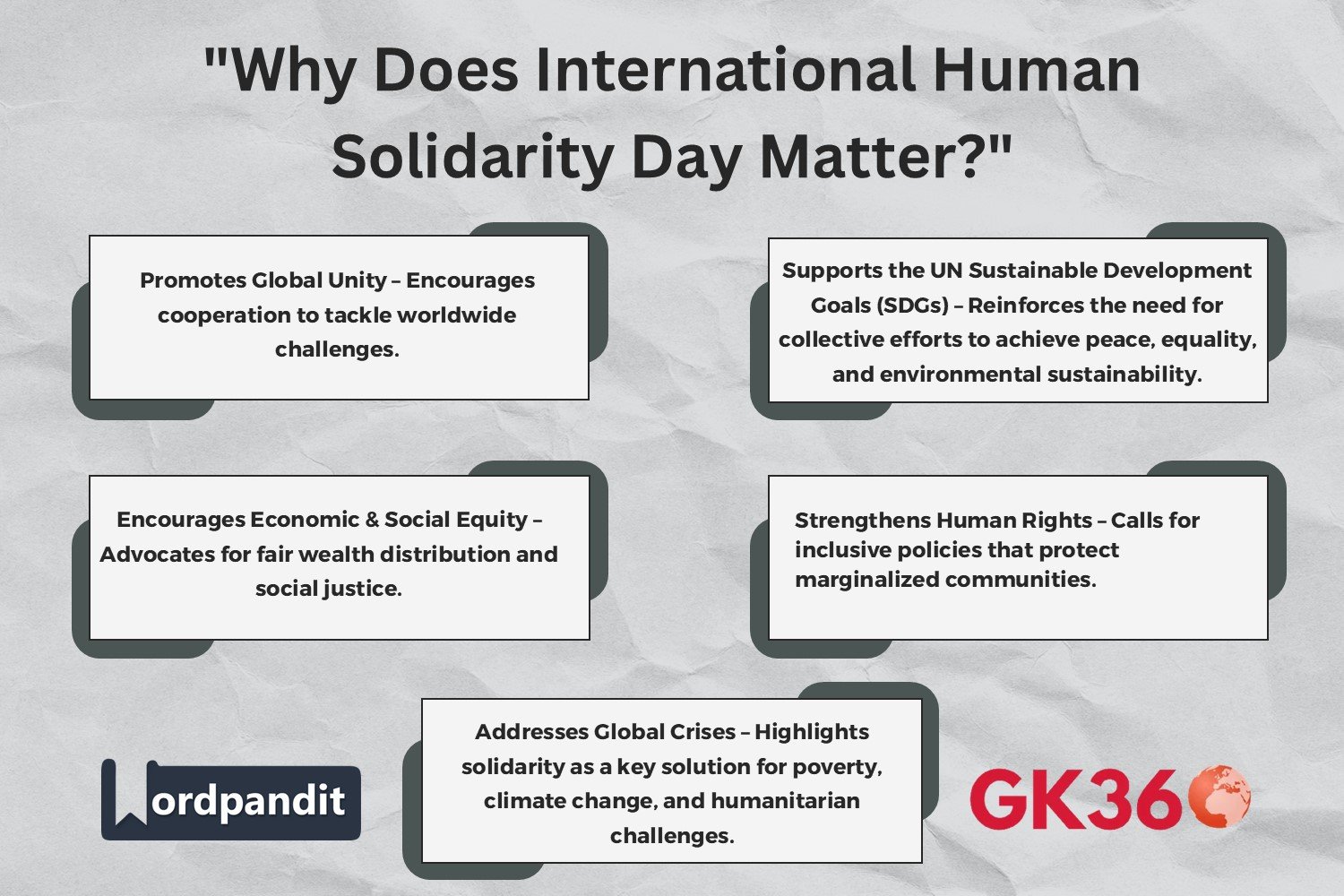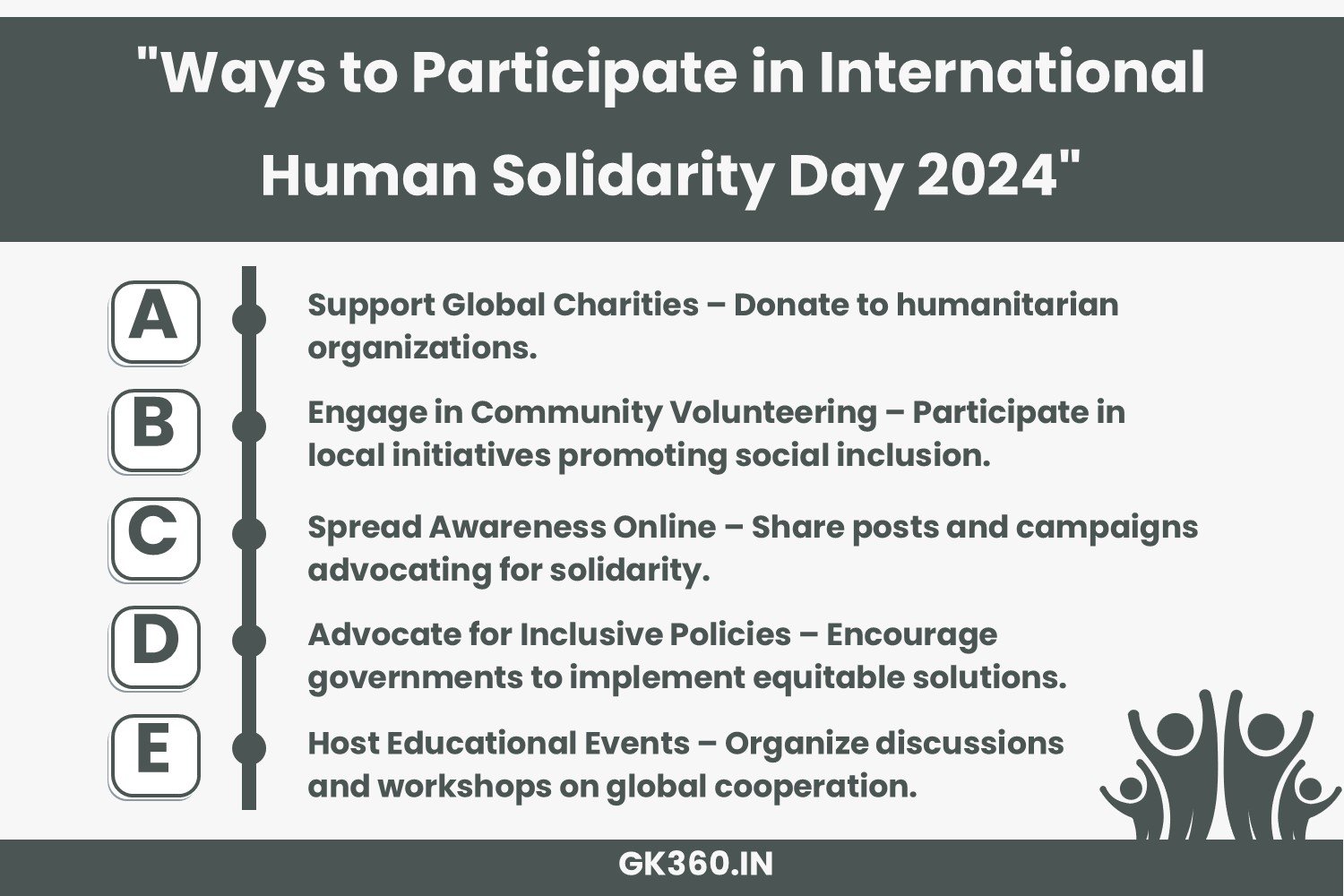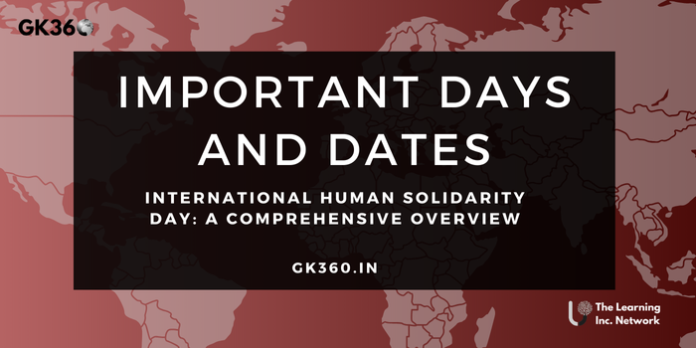International Human Solidarity Day 2024: Significance, Objectives, and How to Get Involved
Introduction
Observed annually on December 20, International Human Solidarity Day highlights the importance of unity and collective action in building a fair and just global society. Established by the United Nations (UN) General Assembly in 2005, this observance underscores the role of solidarity in addressing global issues such as poverty, inequality, and climate change.
Solidarity is more than just a principle—it is a driving force behind peace, social justice, and sustainable development. The day serves as a call for governments, organizations, and individuals to collaborate in creating inclusive policies and initiatives that benefit all of humanity.

Table of Contents
- What is International Human Solidarity Day?
- History and Significance
- The Role of the United Nations in Promoting Solidarity
- Core Values of Solidarity
- Key Goals of International Human Solidarity Day
- Principles and Applications of Solidarity
- How to Celebrate International Human Solidarity Day
- FAQs
- Conclusion & Call to Action
What is International Human Solidarity Day?
International Human Solidarity Day is an annual UN observance that promotes the idea that collective responsibility and cooperation are key to tackling global challenges. The day highlights the importance of international partnerships and emphasizes the need for shared efforts in achieving peace, development, and social justice.
History and Significance
Established in 2005, this day was introduced by the United Nations General Assembly as part of its commitment to promoting solidarity as a fundamental value in international relations. The observance aligns with the UN Sustainable Development Goals (SDGs) and reinforces the principle that global challenges require united responses.
Solidarity is vital for fostering global stability, ensuring equal opportunities, and reducing disparities in wealth and resources. The day acts as a reminder that cooperation among nations is essential for achieving lasting peace and development.
The Role of the United Nations in Promoting Solidarity
- UN Sustainable Development Goals (SDGs): Addressing issues like poverty, climate change, and education through global cooperation.
- Humanitarian Aid Programs: Mobilizing resources and support for communities affected by crises.
- International Peacekeeping Missions: Promoting diplomatic solutions and stability in conflict regions.
- Global Partnerships: Encouraging nations to work together in tackling pressing social and economic issues.
Core Values of Solidarity
- Collective Security: Nations must support one another to maintain global peace and security, ensuring no country faces crises alone.
- Cross-Border Cooperation: Addressing challenges like poverty, climate change, and human rights violations requires collaboration beyond national boundaries.
- Human-Centered Development: Solidarity ensures that global policies prioritize equity, inclusion, and social welfare, leaving no one behind.
Key Goals of International Human Solidarity Day
- Promoting Unity in Diversity
- Encouraging Government Accountability
- Raising Public Awareness
- Fostering Global Initiatives

Principles and Applications of Solidarity
- International Cooperation: Nations must work together to combat climate change, health crises, and economic instability.
- Social and Solidarity Economy (SSE): Encouraging sustainable economic models that prioritize mutual aid, voluntary cooperation, and community-driven initiatives.
- Advancing Human Rights: Ensuring that all individuals, regardless of background, have access to dignity, freedom, and justice.
How to Celebrate International Human Solidarity Day
- Support Global Causes
- Volunteer for Community Initiatives
- Raise Awareness on Social Media
- Advocate for Policy Change
- Organize Events & Discussions
FAQs
1. Why is International Human Solidarity Day observed on December 20?
The United Nations chose this date to highlight the importance of solidarity in achieving sustainable global development and promoting peace.
2. What are the main objectives of International Human Solidarity Day?
The day focuses on raising awareness about social justice, encouraging collective action, and fostering global cooperation to address pressing global challenges.
3. How does the UN promote solidarity worldwide?
Through humanitarian aid, peacekeeping efforts, global partnerships, and initiatives supporting the Sustainable Development Goals (SDGs).
4. How can individuals contribute to International Human Solidarity Day?
By volunteering, donating to charitable causes, raising awareness, and advocating for policies that promote equality and human rights.
5. What is the connection between solidarity and the SDGs?
Solidarity is the foundation of the United Nations Sustainable Development Goals (SDGs), ensuring that nations work together to eradicate poverty, combat climate change, and promote human rights.
Conclusion & Call to Action
International Human Solidarity Day is a powerful reminder that the world’s most pressing issues require collective action and global unity. As we commemorate this day in 2024, let’s embrace the values of solidarity, cooperation, and mutual support to create a more inclusive and just world.
Whether through volunteering, advocacy, donations, or spreading awareness, every individual can make a difference. Join the movement today and take action towards a better future for all!
Key Takeaways Table
| Aspect | Details |
|---|---|
| Date of Observance | December 20, annually. |
| Established By | United Nations General Assembly in 2005. |
| Purpose | Promote global unity and shared responsibility in tackling global issues. |
| Key UN Initiatives | SDGs, humanitarian aid, peacekeeping missions, global partnerships. |
| Core Values | Solidarity, equality, cooperation, and social justice. |
| Ways to Celebrate | Donations, volunteering, social media advocacy, policy activism. |
| Impact on Global Issues | Helps reduce poverty, promote human rights, and achieve sustainable development. |
SEO-Driven Tags
- International Human Solidarity Day 2024
- Global Unity and Cooperation
- UN Sustainable Development Goals (SDGs)
- How to Promote Social Justice
- Global Poverty and Inequality Solutions
- Volunteer for International Solidarity
- Solidarity and Human Rights
- December 20 UN Observance
- Peace and Development Initiatives
- Ways to Support Global Causes





